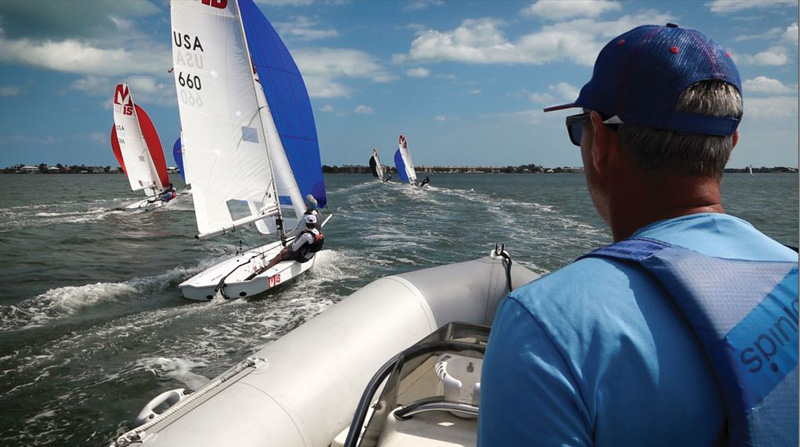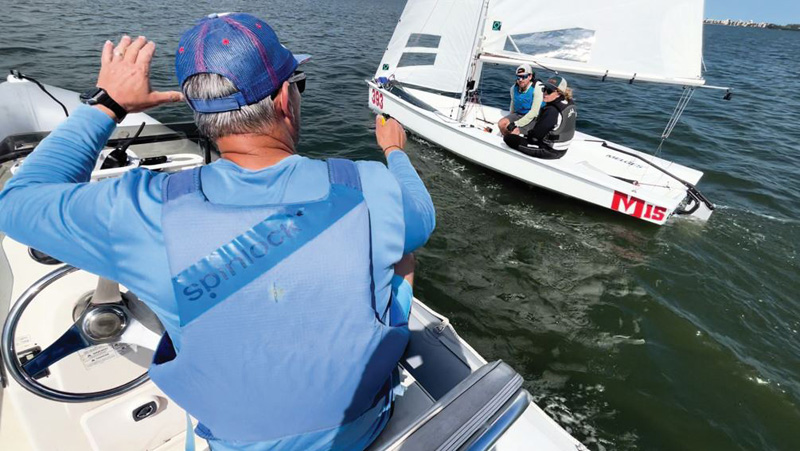Small boat racing success demands practice
Practice, practice, practice. Success in small boat racing demands practice. While it would be great if we could just show up at regattas and be ready to compete, that’s just not the way it is. Lucky for us, sailing is fun, so practice is, too.

I’m an advocate for focused practice sessions. Yes, there are benefits to going out and sailing around for four hours, but hitting the water with an agenda and list of skills you want to refine that you tackle over, say, an hour and a half will likely bring more tangible rewards.
Why you should practice like you play
It’s also important to “practice like you play.” That means your practice time reflects how you race—both in your intensity and in the sailing skills you focus on.
Intensity is a big reason why you should keep your practice sessions tight. “Practice like you play” means sailing at 100 percent for close to 100 percent of the time you are on the water. On regatta days, from the time you leave the dock until when you’re almost back on shore, you need to be tuned in and observant. Honestly, that can be pretty tiring, especially mentally. If you practice being that focused for extended periods on training days, you’ll build your mental endurance.
Even on practice days, you can practice your regatta process, building a routine for checking weather forecasts and tide and current predictions. Training days are great opportunities to lock in your nutrition and hydration, too.
“Practice like you play” also means that the skills you practice should be the skills you use while racing. “Muscle memory” helps you build a suite of capabilities that you use without conscious thought. Not only does it let you perfect your boathandling, but it also helps to root deeply in your brain how you move and what your reactions are to certain situations.
It makes sense to most of us that, to improve our roll tacks so that we don’t have to think (much) about them while we’re racing, we go out and do roll tack after roll tack. In practice, we can break tacks down into steps to help us identify the areas we need to work on. We work on them until we can do them without thinking about the no-longer-problematic parts. That means that while we’re racing, we can just decide—“tack!”—not “tack, but remember to rotate your knees forward as you cross the boat!” (or whatever particular quirk you’re working on).

The importance of muscle memory
As important as it is to positively practice good things that we must incorporate into our racing, it’s also key not to practice the things we need to keep out of our racing. A big example here is kinetics. While it may be fun and speedy to do a little outside-the-rules pumping and rocking downwind, if you do that during practice races (or even low-key regattas you may consider “practice” for bigger events), you’re just training your body and mind to do that anytime (not to mention that, well, it’s cheating).
And unfortunately for you, your body and mind may forget to not do those motions at a bigger regatta when an umpire is watching for those actions.
So, yes, definitely practice how to maximize your speed, but save the illegal kinetics for getting back to the dock after practice if the wind dies!
Another “muscle memory” to keep out of your practices is thinking negatively. As you practice—whether it’s boatspeed, boathandling, figuring out rig tune, or other aspects of your sailing—it’s pretty easy to focus on the areas that are not your strengths. From there, it’s easy to turn that into “I’m always so slow” or “My gybes stink.” None of that is fast, not in practice, and definitely not at regattas. How you frame your self-talk matters.
Turn that frown upside down! Reframe your statements: “I’m improving my speed, especially upwind in chop, by practicing today,” or “Gybes are challenging, and I’m doing better at transferring my tiller from hand to hand.” Training your brain to focus on the positive will help you when the going gets rough when you’re racing.
It’s that time of year: Get out on the water for some training. Practice like you play… and then you’ll play like you practice!
by Kim Couranz
About the Author: SpinSheet Small Boat columnist for more than a dozen years, Kim Couranz has earned several national and world titles in Laser Radials (ILCA 6), Snipes, and Lightnings. She has also raced J/22s, J/24s, and Ynglings on an international level.




